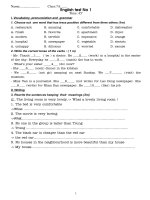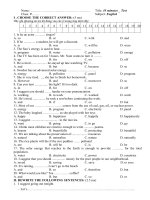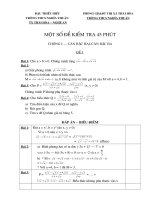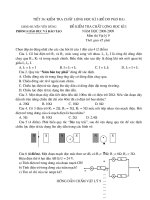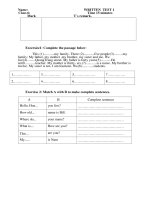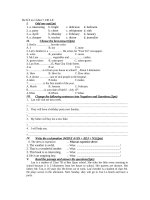De kt so 1 HKI TA 9 Hau Thanh
Bạn đang xem bản rút gọn của tài liệu. Xem và tải ngay bản đầy đủ của tài liệu tại đây (30.98 KB, 2 trang )
<span class='text_page_counter'>(1)</span><div class='page_container' data-page=1>
<b>B. Néi dung:</b>
<b>I/ Find five words whose underlined part is pronounced /d/ of the following words.</b>
(Tìm năm từ mà phần gạch chân của nó đợc phát thành âm /d/ trong số những từ sau)
wanted, stayed, loved, asked, learned, looked, finished, prevented, managed, borrowed
Your
answers: ...
<b>II/ Supply the correct form of the word in the bracket.( Cho dạng đúng của các động từ</b>
trong ngoặc)
1. I wish I (not have) _____________ to learn English at school.
2. She must do her homework if she (want) _____________ to go out.
3. My doctoe told me (stay) _____________ in bed for a few days.
4. Mr.Hung said that he (be) _____________ an engineer.
5. Thu said to me that her father (work) ______________ in a primary school.
Your answers:
1. ...
.... 3. ...
2. ...
.... 4. ...
5. ...
...
<b>III/ Each sentence has a mistake. Find it and correct it. (Mỗi câu có một lỗi sai. Tìm và</b>
sữa lỗi sai đó)
1. Mr.Khanh said that he had to leave now.
2. The landlady told me that I could use these bed covers.
3. If you wanted to lose weight, you must do exercise every morning.
4. They got married in October 28th.
5. I love to watch the stars in the sky on night.
Your answers:
1. ...
2. ...
3. ...
4. ...
5. ...
<b>IV/ Read the following passage. Then answer the questions. </b>
Like other languages, English is always changing, but it changes very slowly. People
invent new words, borrow words from other languages and change the meaning of words
as needed. For examples, the English word "byte" was invented by computer specialists in
1959. The word "tomato"was borrowed from Nahuati, an American Indian language
spoken in Mexico. The word "meat" once referred to food in general. People learn English
as well as languages by listening, copying what they hear, and using the language. Most
school children learn their first language easily and sometimes other languages as well.
1. Does English change
quickly? ...
.
2. Who invent new
words? ...
3. How do people learn English and languages?
...
4. Do school children learn their first language
easily? ...
<b>VI/ Use the given words or phrases to make meaningful sentences.</b>
1. Liz / not / send / us / letter / since / return / USA.
</div>
<span class='text_page_counter'>(2)</span><div class='page_container' data-page=2>
...
<b>VII. Finish the second sentence so that it has the same meaning as the first one.</b>
1. He often makes her cry.
-> She ...
2. It's a pity your friend isn't at this pary.
-> I wish ...
--- ---- The end
<b>---V. Put the word in the correct order to make meaningful sentences.</b>
1. want / must / you / if / to / hard /good / study / you / get / grades.
...
2. She / how many langueges / asked / I / me / speak / could.
...
<b>VI. Choose one sentence that has the same meaning as the root one.</b>
1. It's a pity I can't play chess.
A. I am not interested in chess.
B. I wish I could play chess
2. I don't have time, so I can't visit you.
A. Because I don't have time, I can't visit you.
B. I can visit you because I'm not busy.
<b>Your answers: </b> 1. ...; 2 ...
</div>
<!--links-->
